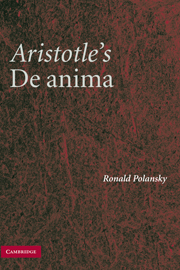Book contents
- Frontmatter
- Contents
- Preface
- List of Abbreviations
- Introduction
- COMMENTARY ON DE ANIMA: : Book 1
- COMMENTARY ON DE ANIMA: Book 2
- COMMENTARY ON DE ANIMA: Book 3
- 1 In the World As It Is There Can Be but the Five Senses
- 2 What Allows for Perceiving That We Perceive; Sense Joins in a Common Power so That the Five Senses Are Subfaculties of a Central Sense Faculty
- 3 Distinguishing Sense and Thought; What Is Phantasia?
- 4 What Is Mind as That Capable of Thinking All Things
- 5 What Enables Thinking to Occur
- 6 The Sorts of Intelligible Objects
- 7 Phantasia Has a Role in All Thinking
- 8 That Mind Can Think All Things
- 9 There Is a Capacity for Progressive Motion
- 10 The Desiderative Capacity Is the Primary Cause of Progressive Motion
- 11 Even the Simplest Animals Have Indefinite Phantasia, and Calculative Phantasia Fits the Account of Progressive Motion
- 12 The Necessary Order of the Faculties of Soul
- 13 The Sort of Body Requisite to Support the Order of the Faculties of Soul
- Bibliography
- Index
10 - The Desiderative Capacity Is the Primary Cause of Progressive Motion
Published online by Cambridge University Press: 18 December 2009
- Frontmatter
- Contents
- Preface
- List of Abbreviations
- Introduction
- COMMENTARY ON DE ANIMA: : Book 1
- COMMENTARY ON DE ANIMA: Book 2
- COMMENTARY ON DE ANIMA: Book 3
- 1 In the World As It Is There Can Be but the Five Senses
- 2 What Allows for Perceiving That We Perceive; Sense Joins in a Common Power so That the Five Senses Are Subfaculties of a Central Sense Faculty
- 3 Distinguishing Sense and Thought; What Is Phantasia?
- 4 What Is Mind as That Capable of Thinking All Things
- 5 What Enables Thinking to Occur
- 6 The Sorts of Intelligible Objects
- 7 Phantasia Has a Role in All Thinking
- 8 That Mind Can Think All Things
- 9 There Is a Capacity for Progressive Motion
- 10 The Desiderative Capacity Is the Primary Cause of Progressive Motion
- 11 Even the Simplest Animals Have Indefinite Phantasia, and Calculative Phantasia Fits the Account of Progressive Motion
- 12 The Necessary Order of the Faculties of Soul
- 13 The Sort of Body Requisite to Support the Order of the Faculties of Soul
- Bibliography
- Index
Summary
In the previous chapter Aristotle offered arguments against all the obvious candidates to serve as the locomotive power. He ended up contending that mind is not the locomotive power because thought without desire does not cause motion and desire dominates intellect in incontinent persons. Yet neither is desire always determinative of motion because mind overcomes it in the continent person (433a1–8). But he begins this chapter suggesting that it appears that both desire and mind move animals according to place. He states, “It is apparent to be sure that these two are movers, either desire or mind, if someone would place phantasia as some sort of intellection” (φαίνεται δέ γε δύο ταῦτα κινοῦντα, ἢ ὄρεξις ἢ νοῦς, εἴ τις τὴν φαντασίαν τιθείη ὡς νόησίν τινα, 433a9–10). Both desire and mind can be in play, since he says “two” (and see a13 immediately afterward), though he may use the disjunction inclusively to allow for either …or, or both together, since one or the other might cause motion or both together, and even if these always somehow work together, they often seem to be in opposition. That phantasia can be called some sort of noesis was already suggested in iii 3.427b16–17 and b27–29. If nous includes phantasia, and beasts are moved by phantasiai, then nous may have a clear role in animal motion.
- Type
- Chapter
- Information
- Aristotle's De AnimaA Critical Commentary, pp. 514 - 526Publisher: Cambridge University PressPrint publication year: 2007



